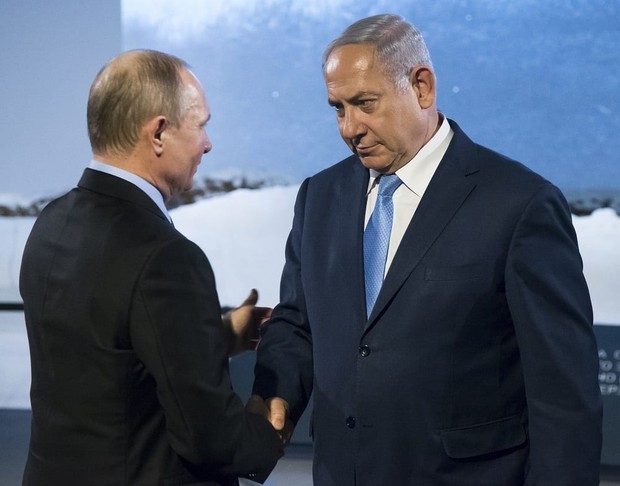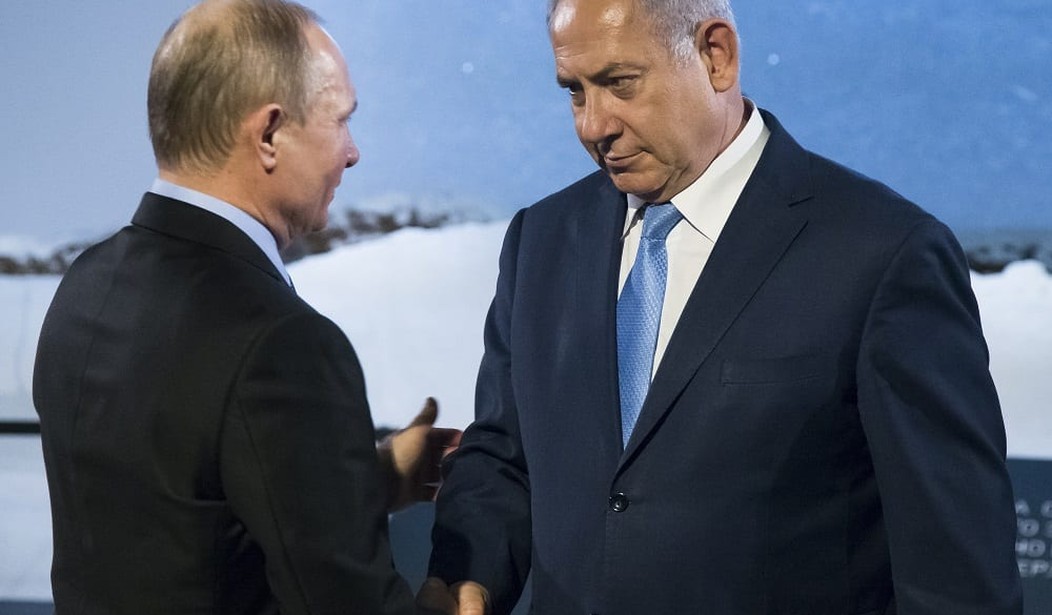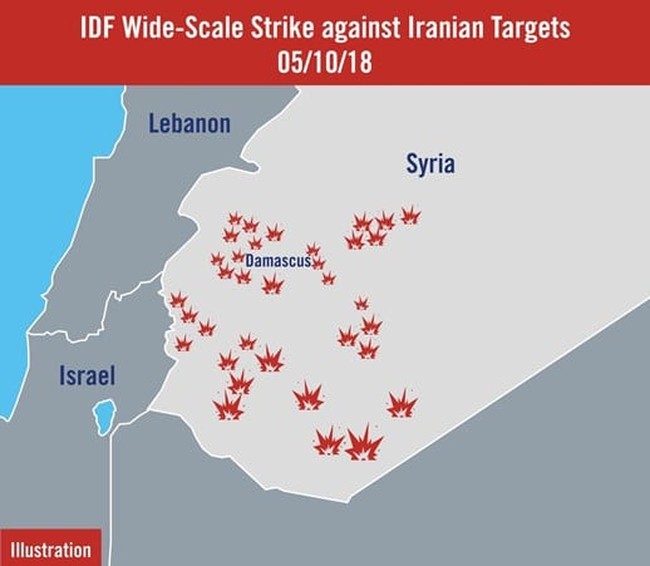
Russian President Vladimir Putin, left, shakes hands with Israeli Prime Minister Benjamin Netanyahu during their meeting marking 75th anniversary of the Sobibor uprising, the only successful uprising that took place in a death camp during World War II at the Jewish Museum and Tolerance Center in Moscow in Moscow, Russia, Monday, Jan. 29, 2018. (AP Photo/Alexander Zemlianichenko)
Shortly after the last round of US and allied airstrikes against Syria for using chemical weapons on a civilian target, Russia made noises about selling one of its most advanced anti-aircraft missile system, the S-300 or NATO designated SA-10, to Syria.
This brought a positively orgasmic response from the media. Here is Reuters: Russia: U.S. strikes remove moral hurdles for S-300 missiles for Assad – RIA.
According to military analysts, the S-300 surface-to-air missile system would improve Russia’s ability to control air space in Syria, where Moscow’s forces support the government of President Bashar al-Assad, and could be aimed at deterring tougher U.S. action.
Then we had last Wednesday. In retaliation for Israel attacking a drone base staffed by Iranians and killing some of the tens of thousands or Iranian colonels and generals (I swear, it seems like an Iranian infantry squad has a general and three or four colonels) in Syria, Iran launched about 20 missiles against Israeli military targets in the Golan Heights. All things considered, it was a symbolic response. For once, the terrorist regime didn’t target women and children and it didn’t attack Israel proper.
This stunt drew a disproportionate response designed to let the Iranians know what they were risking. (And no, the bizarro world theory that Israel’s attack was linked to Trump leaving the Iran nuclear deal is just anti-Trump claptrap. For a week, Israel had been reporting on Iranian troop movements that indicated some kind of military response was being planned and for two days prior to the Iranian attack settlers in the Golan had been warned that an attack was coming.)
The IDF struck an SA22 aerial interception system as part of a wide-scale attack against Iranian military sites in Syria pic.twitter.com/dFGXIwMT45
— Israel Defense Forces (@IDF) May 10, 2018
BREAKING: Israeli Minister of Defense Lieberman in a message to Iran after tonight's clashes in Syria: "If it rains in Israel it will pour in Iran"
— Barak Ravid (@BarakRavid) May 10, 2018
This from the IDF:
Iran is actively conducting its military activities beyond its borders, which not only is a threat to Israel, but to the Middle East as a whole. On Wednesday, May 9, 2018, the Quds force, a special force wing of the Iranian Revolutionary Guard, stationed in Syria, shot 20 rockets towards IDF posts in the Golan Heights. The IDF intercepted four of the rockets, preventing casualties and damage. This is the first time that Iranian forces have directly fired at Israeli troops.
In response, IDF fighter jets struck dozens of military targets in Syria that belonged to Iran’s Quds force. The IDF’s wide-scale attack included Iranian intelligence sites, the Quds force logistics headquarters, an Iranian military compound in Syria, observation and military posts, et cetera. In spite of a warning from Israel, Syrian aerial defense forces fired towards the IAF aircraft as they conducted the strikes. In response, the IAF targeted several aerial interception systems (SA5, SA2, SA22, SA17) which belong to the Syrian Armed Forces. All of the IDF’s fighter jets returned to their bases safely.
Hours after the Israeli strikes, Benjamin Netanyahu was paying a call on Vladimir Putin.
Russia is unlikely to limit Israel’s military actions in Syria, Israeli Prime Minister Benjamin Netanyahu said after meeting Russian President Vladimir Putin on Wednesday, according to remarks carried by the Reuters news agency.
Netanyahu visited Moscow to discuss the Syrian war and tensions between Israel and Iran with the Russian leader.
“I think that matters were presented in a direct and forthright manner, and this is important,” Netanyahu said after meeting Putin. “These matters are very important to Israel’s security at all times and especially at this time.”
And then on Friday, this happened. Again, via Reuters who was not quite as tumescent this time: Russia, after Netanyahu visit, backs off Syria S-300 missile supplies.
Russia is not in talks with the Syrian government about supplying advanced S-300 ground-to-air missiles and does not think they are needed, the Izvestia daily cited a top Kremlin aide as saying on Friday, in an apparent U-turn by Moscow.
…
Russia last month hinted it would supply the weapons to President Bashar al-Assad, over Israeli objections, after Western military strikes on Syria. Foreign Minister Sergei Lavrov said the strikes had removed any moral obligation Russia had to withhold the missiles and Russia’s Kommersant daily cited unnamed military sources as saying deliveries might begin imminently.But Kozhin’s comments, released so soon after Netanyahu’s Moscow talks with Putin, suggest the Israeli leader’s lobbying efforts have, for the time being, paid off.
I guess you could call it lobbying…
Russian military equipment is substandard crap. The Russians operate on the idea that “quantity has a quality all its own.” In particular, its air defense systems have been shown, time and again, to be overmatched by US airpower. Russia is trying to sell the S-300 to other countries and it is important to note that Lavrov’s moral concerns were eased by the fact that an Israeli F-16 had been downed by a Russian built anti-aircraft missile earlier in the year as anything else. The ability to shoot down Israeli aircraft was part of the sales pitch. Wednesday, Syrian anti-aircraft defenses were not even a nuisance to Israeli pilots. The writing was on the wall. The shootdown of the F-16 was not the new normal, it was blind luck. Did the Russians really want their top line missile, crewed by Arabs, going up against the Israeli Air Force? What would that do for sales?
It seems as though Russia has gotten the message that Israel is dead serious about shutting down Iranian adventurism in Syria. They are willing to maul the Syrians if they get in the way and, to the extent that Russian troops are collocated with Syrians, they could become collateral damage. By not selling the S-300 to Syria, Putin is sending a huge message to Iran and Syria. He doesn’t want any part of a fight with Israel. That is a damned wise decision on his part.















Join the conversation as a VIP Member